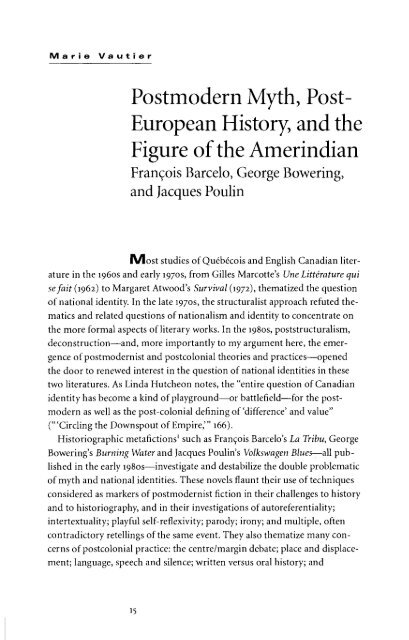The Carpathians - University of British Columbia
The Carpathians - University of British Columbia
The Carpathians - University of British Columbia
Create successful ePaper yourself
Turn your PDF publications into a flip-book with our unique Google optimized e-Paper software.
Marie<br />
V a u t i e r<br />
Postmodern Myth, Post-<br />
European History, and the<br />
Figure <strong>of</strong> the Amerindian<br />
François Barcelo, George Bowering,<br />
and Jacques Poulin<br />
Most studies <strong>of</strong> Québécois and English Canadian literature<br />
in the 1960s and early 1970s, from Gilles Marcotte's Une Littérature qui<br />
se fait (1962) to Margaret Atwood's Survival (1972), thematized the question<br />
<strong>of</strong> national identity. In the late 1970s, the structuralist approach refuted thematics<br />
and related questions <strong>of</strong> nationalism and identity to concentrate on<br />
the more formal aspects <strong>of</strong> literary works. In the 1980s, poststructuralism,<br />
deconstruction—and, more importantly to my argument here, the emergence<br />
<strong>of</strong> postmodernist and postcolonial theories and practices—opened<br />
the door to renewed interest in the question <strong>of</strong> national identities in these<br />
two literatures. As Linda Hutcheon notes, the "entire question <strong>of</strong> Canadian<br />
identity has become a kind <strong>of</strong> playground—or battlefield—for the postmodern<br />
as well as the post-colonial defining <strong>of</strong>'difference' and value"<br />
("'Circling the Downspout <strong>of</strong> Empire,'" 166).<br />
Historiographie metafictions 1 such as François Barcelo's La Tribu, George<br />
Bowering's Burning Water and Jacques Poulin's Volkswagen Blues—all published<br />
in the early 1980s—investigate and destabilize the double problematic<br />
<strong>of</strong> myth and national identities. <strong>The</strong>se novels flaunt their use <strong>of</strong> techniques<br />
considered as markers <strong>of</strong> postmodernist fiction in their challenges to history<br />
and to historiography, and in their investigations <strong>of</strong> autoreferentiality;<br />
intertextuality; playful self-reflexivity; parody; irony; and multiple, <strong>of</strong>ten<br />
contradictory retellings <strong>of</strong> the same event. <strong>The</strong>y also thematize many concerns<br />
<strong>of</strong> postcolonial practice: the centre/margin debate; place and displacement;<br />
language, speech and silence; written versus oral history; and

















